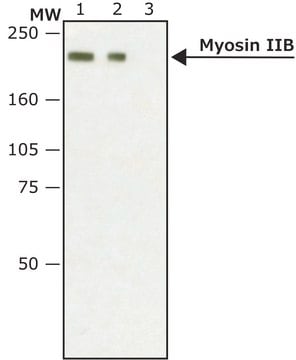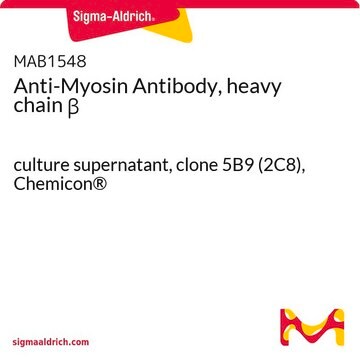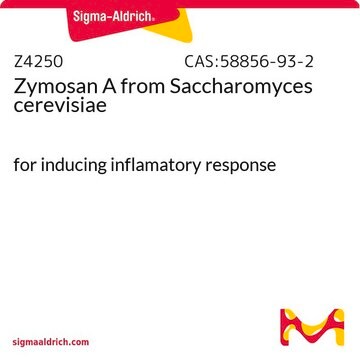ABT1340
Anti-Myosin-10/MYH10/Myosin IIB Antibody
from rabbit, purified by affinity chromatography
Synonyme(s) :
Myosin-10, Cellular myosin heavy chain, type B, Myosin heavy chain 10, Myosin heavy chain, non-muscle IIb, NMMHC-B, NMMHC II-b, NMMHC-IIB, Non-muscle myosin heavy chain B, Non-muscle myosin heavy chain Iib, MHC IIB
About This Item
Produits recommandés
Source biologique
rabbit
Niveau de qualité
Forme d'anticorps
affinity isolated antibody
Type de produit anticorps
primary antibodies
Clone
polyclonal
Produit purifié par
affinity chromatography
Espèces réactives
human, mouse
Réactivité de l'espèce (prédite par homologie)
rat (based on 100% sequence homology)
Technique(s)
immunocytochemistry: suitable
immunofluorescence: suitable
western blot: suitable
Numéro d'accès NCBI
Numéro d'accès UniProt
Conditions d'expédition
wet ice
Modification post-traductionnelle de la cible
unmodified
Informations sur le gène
human ... MYH10(4628)
Description générale
Spécificité
Immunogène
Application
Western Blotting Analysis: A representative lot detected elevated MHC IIB expression in MDA-MB-468, MDA-MB-231, and MCF10A, while very low MHC IIB expression was detected in MCF7, T47D, BT-474, and SKBR3 (Beach, J.R., et al. (2011). Proc. Natl. Acad. Sci. U. S. A. 108(44):17991-17996).
Western Blotting Analysis: A representative lot detected MHC IIB levels in NMuMG murine mammary gland cells upon TGF-beta stimulation or shRNA-mediated hnRNP E1 knockdown. E1 overexpression obolished TGF-beta stimulated MHC IIB upregulation in NMuMG cells (Beach, J.R., et al. (2011). Proc. Natl. Acad. Sci. U. S. A. 108(44):17991-17996).
Immunocytochemistry Analysis: A representative lot detected MHC IIB immunoreactivity localized to the rear and perinuclear regions of migrating and transmigrating hnRNP E1-knockdown murine mammary gland E1-shRNA NMuMG cells by fluorescent immunocytochemistry staining of 4% paraformaldehyde-fixed, 0.1% TritonX-100-permeablized cells (Beach, J.R., et al. (2011). Proc. Natl. Acad. Sci. U. S. A. 108(44):17991-17996).
Immunofluorescence Analysis: A representative lot detected MHC IIB immunoreactivity predominantly in the SAM-expressing myoepithelial layer, but not the cytokeratin 8-expressing luminal layer, in 4% paraformaldehyde-fixed, paraffin-embedded mouse mammary tissue sections by fluorescent immunohistochemstry (Beach, J.R., et al. (2011). Proc. Natl. Acad. Sci. U. S. A. 108(44):17991-17996).
Qualité
Western Blotting Analysis: 1.0 µg/mL of this antibody detected Myosin-10/MYH10/Myosin IIB in 10 µg of A549 cell lysate.
Description de la cible
Autres remarques
Vous ne trouvez pas le bon produit ?
Essayez notre Outil de sélection de produits.
Code de la classe de stockage
12 - Non Combustible Liquids
Classe de danger pour l'eau (WGK)
WGK 1
Point d'éclair (°F)
Not applicable
Point d'éclair (°C)
Not applicable
Certificats d'analyse (COA)
Recherchez un Certificats d'analyse (COA) en saisissant le numéro de lot du produit. Les numéros de lot figurent sur l'étiquette du produit après les mots "Lot" ou "Batch".
Déjà en possession de ce produit ?
Retrouvez la documentation relative aux produits que vous avez récemment achetés dans la Bibliothèque de documents.
Notre équipe de scientifiques dispose d'une expérience dans tous les secteurs de la recherche, notamment en sciences de la vie, science des matériaux, synthèse chimique, chromatographie, analyse et dans de nombreux autres domaines..
Contacter notre Service technique








